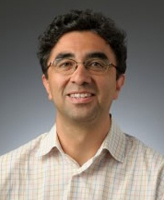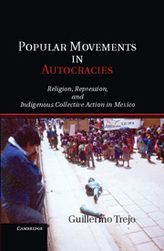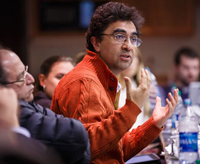
Just as the Zapatista uprising in Chiapas on January 1, 1994, was a turning point in Mexico’s history, it was a turning point for Guillermo Trejo, associate professor in Notre Dame’s Department of Political Science and a faculty fellow in the Kellogg Institute for International Studies.
Until that January, Trejo’s goal was to learn everything he could about the economics of poverty in his native Mexico and what policies might best alleviate it, with what he describes as a “top-down” orientation.
After the extraordinary events of that day—when after years of peaceful mobilization and land struggle, an estimated 3,000 armed Mayan peasants launched a major military offensive against the Mexican government on the day the North American Free Trade Agreement (NAFTA) went into effect—his perspective changed.
“It was a jolt,” he recounts. “It forced me to ask myself, why don’t you try to understand what the poor themselves are doing to overcome poverty?”
“I decided to try to understand collective action, social movements, and armed insurgencies,” he says. “I focused on indigenous peoples—the population segment facing the harshest levels of economic discrimination in Mexico—and that led me into the study of politics.”
Formerly a faculty member at Mexico’s CIDE (Centro de Investigación y Docencia Económicas) and then Duke University, Trejo came to Notre Dame in fall 2012 as associate professor of political science.
Whether he chooses as his lens the role of indigenous people in late 20th-century Mexico or, his topic now—the pervasive problem of organized crime in Latin America, his focus and passion is understanding democracy.
“Most fundamentally,” he says, “my research fits into the study of political change, democratization, and how democracies work.”
From Activist Roots
With a grandmother who lived through Mexico’s Cristero War in the 1920s, Trejo grew up listening to stories about religion, violence, war, and displacement.
He was active in pro-democracy movements and demonstrations as a politicized college student in Mexico City in the late 1980s and during his college years joined Jesuit missionaries in grassroots organizing of urban, rural, and indigenous movements in Mexico City, Coahuila, and Veracruz.
While teaching and researching at CIDE from 1997 to 2005, Trejo was involved in discussions of the peace process in Chiapas and of indigenous rights elsewhere. He was also a regular participant in the quarterly meetings of SERAPAZ (Service for the Peace), an organization founded by the late Bishop of Chiapas Samuel Ruiz to bring together leaders of social and indigenous movements and human rights NGOs for dialogue on challenges and strategies for local and national political action.
“Being socially and politically active has led me to ask fundamental questions about politics, about autocracies at work, and about how people defy authoritarian rule,” Trejo says.
The True Role of Indigenous Peoples in Mexico’s Democratization
In his recent book, Popular Movements in Autocracies: Religion, Repression, and Indigenous Collective Action in Mexico (Cambridge University Press, 2012), Trejo analyzes a major cycle of indigenous protest that took place in Mexico as the country transitioned from authoritarian rule to democracy and shows the crucial role that indigenous mobilization had in Mexico’s democratization.

As has been true in many other authoritarian regimes, Trejo says, religion played a major role in the rise of an independent civil society in Mexico. There, the Catholic Church vigorously promoted indigenous networks and movements for land redistribution and indigenous rights in areas where US Protestant missionaries had become active.
“The competition for souls,” he says, “led prominent Catholic bishops and priests to build the social infrastructure for the mobilization of Mexico’s most marginalized and excluded ethnic minority groups.”
As has also been true in many other authoritarian regimes, he says, religious networks contributed to different kinds of collective action in Mexico—to non-violent indigenous protest but also to armed insurgency.
By collecting and analyzing data from 20 states and 883 counties or municipalities from 1975 through 2000—in places where protest and rebellion occurred and where they did not—Trejo demonstrates that whether peaceful protest became armed rebellion depended less on religion than on how authoritarian rulers dealt with dissident movements.
“While peasant indigenous movements in Mexico had mobilized for years over land redistribution,” he says, “peaceful protest turned violent, as it did in Chiapas in 1994, when local politicians relied on repressive measures to implement an ambitious and unpopular national agricultural reform that put an end to six decades of land reform and liberalized land tenure.”
“When fundamental rights are violently taken away from people, they tend to radicalize. And that is true of indigenous movements in El Salvador in 1979 or Algeria in 1991 or Chiapas in 1994.”
“Social protest and local rebellions can lead to civil war but, other times, to democratization,” Trejo suggests. A key claim of his book is that counter to previous explanations of Mexico’s democratization, Mexican elites relinquished controls over elections and consented to free and fair elections only after the Chiapas rebellion. Elites democratized elections to avoid a generalized uprising.
Why Peace in Some Democracies but Violence in Others?
For the past two years, Trejo has turned his attention to a new democracy puzzle—one that is important to solve for both scholars and citizens.
“So many fought so hard and so long to democratize Mexico and other Latin American countries,” he observes. “One would expect democracy to produce development, peace, and a good quality of life.”
Yet, he points out, with the surge in recent years of organized crime—drug trafficking, racketeering, mafias, private militias, and paramilitary groups—Mexico and other countries in Latin America are experiencing unprecedented levels of criminal violence.
According to Trejo, organized crime in Mexico alone has been responsible for 70,000 deaths, 20,000 disappearances, and the displacement of 150,000 people in the last six years. The number of deaths, he says, is higher than at any time since the Mexican Revolution and five times higher than the typical number of deaths in civil wars around the world during the 20th century.
“While we need to know how we got here and what can we do to get out,” he says, “the overarching question is: why do some democracies produce peace and development and others the opposite?”
The Importance for the Rule of Law of Reframing Security Systems
Trejo’s working hypothesis is that answers hinge on the quality of the transition from authoritarian rule to democracy.
“When transitions primarily address elections without concurrently reframing security systems,” he believes, “violence is pervasive.”

“Those countries that adopted democratic rule simultaneously with competitive elections and judicial reform, punished corruption and human rights violations that occurred under autocratic rule, and also transformed their military and police forces, have not experienced the levels of violence of those that failed to take these actions.”
Brazil, Honduras, Guatemala, Mexico, and Paraguay are countries he points to as failing to take the necessary actions. All have witnessed major expansions of organized crime and violence.
Chile, Uruguay, and Nicaragua, on the other hand, are examples of countries that did reframe their security systems successfully—and remain relatively peaceful.
“Nicaragua is instructive,” Trejo says. “The series of major security reforms that the Sandinistas and the post-Sandinista governments introduced, particularly the development of powerful community-level police forces, have helped the country resist the expansion of Mexican drug cartels and have kept levels of criminal violence at much lower levels than its neighbors.”
Just as he used a rigorous comparative analysis to drill down to answers in his study of the role of indigenous people and protests in Mexico’s democratization, Trejo is building a major dataset on subnational organized crime violence in Mexico and a cross-national dataset on organized crime and homicides for all countries that democratized in the past 35 years.
The Policy Implications of Trejo’s Scholarship
In addition to its scholarly implications, there are profound policy implications for both Trejo’s past and current work.
“As a Mexican citizen living and working in the US,” he says, “I’m committed to social science and theory-building, but I’m also deeply committed to how both can contribute to change policies and realities in Mexico and Latin America. I can’t divorce what I do as a scholar from its impact on policy.”
He believes that the lessons of his first book are instructive for Mexico’s current leaders.
“Mexico is a democracy now—although a contested and complicated and fragile democracy with lots of violence. As its new leaders embark on major constitutional, legal, and institutional reforms, they would find many lessons in my book on how to implement unpopular policies without leading the country into a major rebellion.”
As organized crime violence continues to escalate across Latin America, the policy implications for Trejo’s new research project are even more evident—for both policymakers and citizens, he maintains.
“We’re facing a generational challenge of building effective and accountable security forces, police forces, military forces, and the foundation of the rule of law,” he says. “People are coming to understand that attention to the rule of law is not just something for governments. Business leaders and communities must be involved as well.”
Last year, Trejo took part in a workshop organized by the Universidad Loyola del Pacífico on how citizens and communities can engage in conflict resolution and peace building in the midst of crime and violence. Held in Acapulco, participants were academics, politicians, religious leaders, members of grassroots organizations, and families of victims of organized crime.
“The early findings of my research on the importance of reframing security systems were crucial for this workshop,” he says. “There is a tremendous need for information, for understanding, in Mexico.”
Finding a Home at Kellogg
Given Trejo’s intertwined goals of scholarship and policy, he says that the Kellogg Institute and Notre Dame as a whole are proving to be “an ideal environment” for him.
“This is one place where science and policy can come together in a very natural way,” he observes.
“Kellogg’s tradition of combining state-of-the-art research in the humanities and social sciences with country- or region-specific scholarship is unique. In many of the most influential world-class universities, social sciences and area studies are at odds. They are not at Kellogg.”
Kellogg returns the compliment wholeheartedly.
“Recruiting Guillermo to Kellogg and Notre Dame,” says Associate Professor of History and Kellogg Faculty Fellow Ted Beatty “has helped boost our capacity to think about Mexico and has already helped catalyze an exciting range of visitors, seminars, and workshops focused on that country.”
“Most importantly, Guillermo’s arrival helps us ensure that one of the world’s great places to study Latin American and comparative politics will maintain its reputation well into the future.”
Learn More >
- Guillermo Trejo faculty page
- Department of Political Science
- Kellogg Institute for International Studies
- Related story on Trejo’s political science research lab
- Related story: Four Scholars Join Political Science faculty
- Popular Movements in Autocracies: Religion, Repression, and Indigenous Collective Action in Mexico
Originally published at kellogg.nd.edu
Originally published by at al.nd.edu on April 23, 2013.